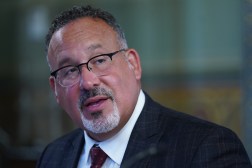Provosts want more data on tech access, student needs, survey finds

Community college provosts want to collect more information on the needs that contribute to a student’s well-being — like food security, mental health and access to technology — according to a survey released Wednesday.
The research, published by a nonprofit consulting firm called Ithaka S+R, included more than 1,000 university provosts who weighed in on data collection. While only 35% reported collecting “a great deal or a lot” of data on food security, about 75% said they were interested in having better data on that topic. A similar gap was found when provosts were interviewed about access to Wi-Fi.
And while only 25% of community colleges collected a lot of information on mental health and well-being, 75% of respondents said they were interested in having better data.
The survey’s results come at a time where students have higher demand for services because of the coronavirus pandemic’s effects. In a recent survey from Cengage, which surveyed 1,469 students, respondents listed stress, level of motivation and having time to do coursework as the top challenges, followed by support by the institution.
Though colleges generally suffered enrollment drops, community colleges were harder-hit because the institutions serve non-traditional learners and a wider demographic. Higher education institutions, while implementing online learning, also needed to learn how to support students facing economic challenges, and having data on students’ economic needs could help institutions make decisions.
The Ithica survey also tracked social justice initiatives, like closing achievement gaps and increasing social mobility, finding that between 2019 and 2020 the percentage leaders who listed those initiatives as “extremely important” rose from 24% to 58%. The highest-rated priorities, though, were increasing student retention and increasing student graduation, with 85% and 80% of respondents, respectively, marking those factors as “extremely important.”
Provosts were most likely to list accreditors as highly influential on what data their schools collected, followed by the state education departments and the Integrated Postsecondary Education Data System.
When asked what barred expanding the data collected, 53% listed lack of human resources in institutional research, followed by shortages of digital infrastructure (42%), capacity to incorporate and analyze new metrics (34%) and capacity to determine which holistic metrics to use (26%).
“We see that higher education leaders want to expand and adjust their institutional data collection to incorporate more holistic metrics of student success,” the report reads. “However, while interest is high, and provosts are aware of the benefits that tracking and meeting these needs bring to their institutions, the challenge now lies in prioritizing these metrics and developing centralized data collection processes in the face of limited infrastructure and external incentives to do so.”




